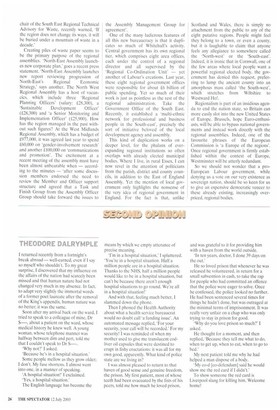THEODORE DALRYMPLE
I returned recently from a fortnight's break abroad — well-earned, even if I say so myself who shouldn't. To my great surprise, I discovered that my influence on the affairs of the nation had scarcely been missed and that human nature had not changed very much in my absence. In fact, to adapt very slightly the immortal words of a former poet laureate after the removal of the King's appendix, human nature was no better; it was the same.
Soon after my arrival back on the ward. I tried to speak to a colleague of mine, Dr S—, about a patient on the ward, whose medical history he knew well. A young woman, whose telephone manner was halfway between dim and pert, told me that I couldn't speak to Dr S—.
'Why not?' I asked.
'Because he's in a hospital situation.' Some people mellow as they grow older; I don't. My fuse shortens. I almost went into one. in a manner of speaking. 'A hospital situation!' I exclaimed. 'Yes, a hospital situation.'
The English language has become the means by which we empty utterance of precise meaning.
'I'm in a hospital situation,' I spluttered. 'You're in a hospital situation. Half a million people are in a hospital situation. Thanks to the NHS, half a million people would like to be in a hospital situation. but can't be because there aren't enough hospital situations to go round. We're all in a hospital situation!'
And with that, feeling much better, I slammed down the phone.
Then I phoned the Health Authority about what a health service bureaucrat would no doubt call 'a funding issue'. An automated message replied, Tor your security, your call will be recorded.' For my security!! was reminded of when my mother used to give me translucent codliver oil capsules that were destined to erupt in fishy eructations: it was all for my own good, apparently. What kind of police state are we living in?
I was almost pleased to return to that haven of good sense and genuine freedom, the prison. My first patient, most of whose teeth had been evacuated by the fists of his peers, told me how much he loved prison, and was grateful to it for providing him with a haven from the world outside.
'In ten years, doctor, I done 39 days on the out.'
He so loved prison that whenever he was released he volunteered, in return for a small subvention in cash, to take the rap for people who had committed an offence that the police were eager to solve. Once he confessed, the police looked no further. He had been sentenced several times for things he hadn't done, but was outraged at the minimal terms of imprisonment. It was really very unfair on a chap who was only trying to stay in prison for good.
'Why do you love prison so much?' I asked.
He thought for a moment, and then replied, 'Because they tell me what to do, when to get up, when to eat, when to go to bed.'
My next patient told me why he had helped a man dispose of a body.
'My co-d [co-defendant] said he would show me the red card if I didn't.'
To show someone the red card is Liverpool slang for killing him. Welcome home!


































































 Previous page
Previous page